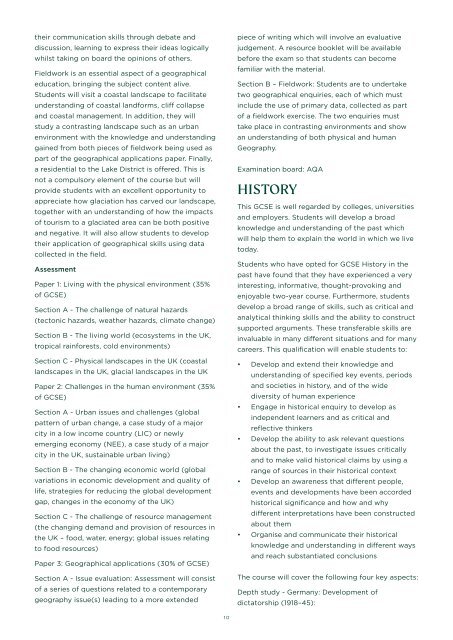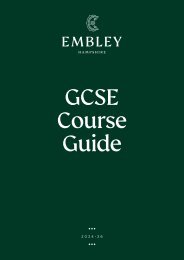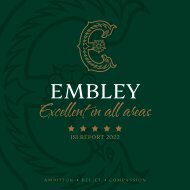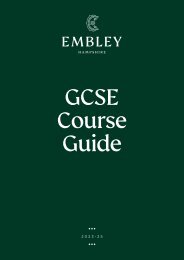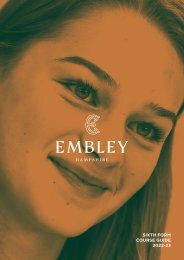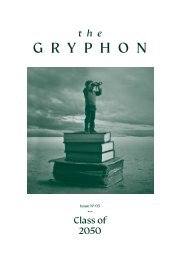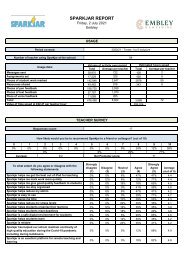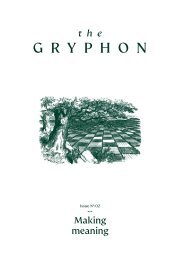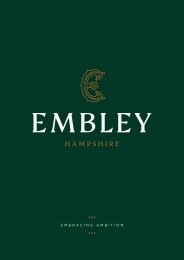Embley's GCSE Course Guide
Create successful ePaper yourself
Turn your PDF publications into a flip-book with our unique Google optimized e-Paper software.
their communication skills through debate and<br />
discussion, learning to express their ideas logically<br />
whilst taking on board the opinions of others.<br />
Fieldwork is an essential aspect of a geographical<br />
education, bringing the subject content alive.<br />
Students will visit a coastal landscape to facilitate<br />
understanding of coastal landforms, cliff collapse<br />
and coastal management. In addition, they will<br />
study a contrasting landscape such as an urban<br />
environment with the knowledge and understanding<br />
gained from both pieces of fieldwork being used as<br />
part of the geographical applications paper. Finally,<br />
a residential to the Lake District is offered. This is<br />
not a compulsory element of the course but will<br />
provide students with an excellent opportunity to<br />
appreciate how glaciation has carved our landscape,<br />
together with an understanding of how the impacts<br />
of tourism to a glaciated area can be both positive<br />
and negative. It will also allow students to develop<br />
their application of geographical skills using data<br />
collected in the field.<br />
Assessment<br />
Paper 1: Living with the physical environment (35%<br />
of <strong>GCSE</strong>)<br />
Section A - The challenge of natural hazards<br />
(tectonic hazards, weather hazards, climate change)<br />
Section B - The living world (ecosystems in the UK,<br />
tropical rainforests, cold environments)<br />
Section C - Physical landscapes in the UK (coastal<br />
landscapes in the UK, glacial landscapes in the UK<br />
Paper 2: Challenges in the human environment (35%<br />
of <strong>GCSE</strong>)<br />
Section A - Urban issues and challenges (global<br />
pattern of urban change, a case study of a major<br />
city in a low income country (LIC) or newly<br />
emerging economy (NEE), a case study of a major<br />
city in the UK, sustainable urban living)<br />
Section B - The changing economic world (global<br />
variations in economic development and quality of<br />
life, strategies for reducing the global development<br />
gap, changes in the economy of the UK)<br />
Section C - The challenge of resource management<br />
(the changing demand and provision of resources in<br />
the UK – food, water, energy; global issues relating<br />
to food resources)<br />
Paper 3: Geographical applications (30% of <strong>GCSE</strong>)<br />
Section A - Issue evaluation: Assessment will consist<br />
of a series of questions related to a contemporary<br />
geography issue(s) leading to a more extended<br />
piece of writing which will involve an evaluative<br />
judgement. A resource booklet will be available<br />
before the exam so that students can become<br />
familiar with the material.<br />
Section B – Fieldwork: Students are to undertake<br />
two geographical enquiries, each of which must<br />
include the use of primary data, collected as part<br />
of a fieldwork exercise. The two enquiries must<br />
take place in contrasting environments and show<br />
an understanding of both physical and human<br />
Geography.<br />
Examination board: AQA<br />
HISTORY<br />
This <strong>GCSE</strong> is well regarded by colleges, universities<br />
and employers. Students will develop a broad<br />
knowledge and understanding of the past which<br />
will help them to explain the world in which we live<br />
today.<br />
Students who have opted for <strong>GCSE</strong> History in the<br />
past have found that they have experienced a very<br />
interesting, informative, thought-provoking and<br />
enjoyable two-year course. Furthermore, students<br />
develop a broad range of skills, such as critical and<br />
analytical thinking skills and the ability to construct<br />
supported arguments. These transferable skills are<br />
invaluable in many different situations and for many<br />
careers. This qualification will enable students to:<br />
• Develop and extend their knowledge and<br />
understanding of specified key events, periods<br />
and societies in history, and of the wide<br />
diversity of human experience<br />
• Engage in historical enquiry to develop as<br />
independent learners and as critical and<br />
reflective thinkers<br />
• Develop the ability to ask relevant questions<br />
about the past, to investigate issues critically<br />
and to make valid historical claims by using a<br />
range of sources in their historical context<br />
• Develop an awareness that different people,<br />
events and developments have been accorded<br />
historical significance and how and why<br />
different interpretations have been constructed<br />
about them<br />
• Organise and communicate their historical<br />
knowledge and understanding in different ways<br />
and reach substantiated conclusions<br />
The course will cover the following four key aspects:<br />
Depth study - Germany: Development of<br />
dictatorship (1918–45):<br />
1 0


